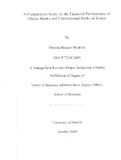| dc.description.abstract | Islamic banking in Kenya started in 2007 with the amendment of Section 53 of the Banking Act Chapter 488 of laws of Kenya in 2006. The amendment was intended to promote the introduction of innovative products in the banking sector including the vehicle for providing Sharia’h compliant financial products. Islamic banking system is characterized by interest frees banking and the avoidance of transactions prohibited by Shari’ah and unethical practices. The interest free principle is replaced by the principle of Profit-and-Loss sharing (PLS). Since 2007, two Islamic banks have opened their doors to the public especially targeting the Muslim community by providing Shari'ah compliant financial products. Conventional banks have realized the value of Islamic financing techniques and begun to incorporate them in their lending practices or via separate Islamic windows. In Kenya, Five conventional banks have also taken advantage of the amendment by providing Shari’ah compliant financial products. Yet, the added services Islamic banks offer is a societal one in complying with Shariah principles and at the same time compete with conventional banks. This raises the question as to how Islamic banks perform compared to their conventional counterparts.
The aim of this study is to evaluate and compare the performances of Islamic banks and conventional banks in Kenya. The study evaluates performance of the Islamic bank in profitability, liquidity, risk, and efficiency for the period of 2008-2009. T-test and F-test were used in determining the significance of the differential performance of the two types of banks. The study found that on average the Islamic banks in Kenya are less profitable and less efficient but more solvent and less risky than the average conventional banks in Kenya. The reasons are due to the facts that conventional banks in Kenya have longer history and experience in doing banking business as compared to Islamic banks which started business two years ago. | en_US |



